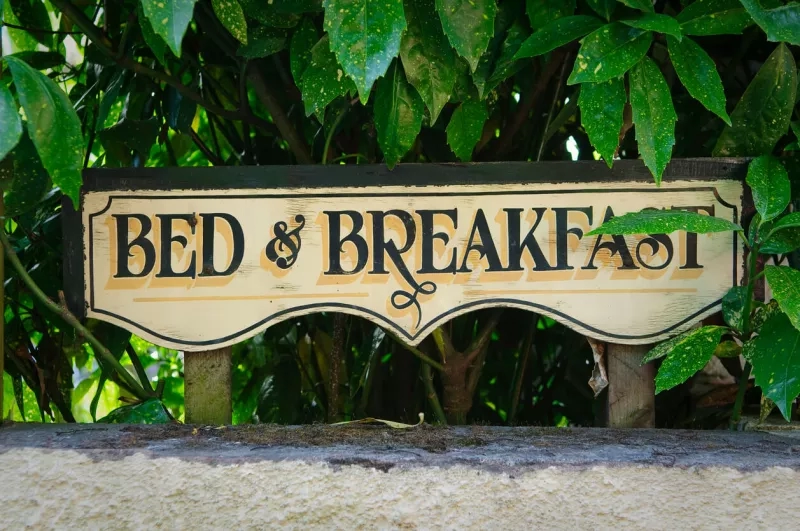From cozy roadside inns with basic cable and morning coffee to massive all-inclusive vacation resorts in the world’s most luxurious destinations, there are dozens upon dozens of different types of hotels located throughout the world.
While some of these properties have many similarities — for example, an all-inclusive resort may also be classified as an extended stay property — there are also some that couldn't be more different (i.e. casino hotels vs. hostels).
Confused? Don't be. In this post, we break down 21 of the most popular types of hotels and explore the similarities and differences of each. Whether you’re a traveler looking for a low-priced economy room or an aspiring hotelier looking to take a deeper dive into your options, the wide world of hotels has something for everyone.
21 of the most popular types of hotels
1. Chain hotels
The most common hotel type on this list, chain hotels make up tens of thousands of properties located throughout the world. Chain hotels typically fall under a group of hotels operated by a company or owner. Hilton, for example, has a portfolio made up of over a dozen "separate" brands, including DoubleTree, Embassy Suites, Hampton, Homewood Suites, and Home2 Suites. Another example is Marriott, which boasts brands such as The Ritz-Carlton, Sheraton, Westin, Gaylord, Courtyard, and SpringHill Suites.
Franchise ownership is common at these properties, which are also known for their frequent renovations and even "secret menus" at some hotel restaurants and bars.
Hoteliers at these properties should know travelers are on the lookout for hidden fees like resort fees and explore the perks of hotel loyalty programs. For example, Marriott International offers a VIP program called Marriott Bonvoy that includes various tiers with rewards like free nights, room upgrades, and even airline partnerships. Some chain hotels offer unadvertised discounts to specific groups when booking directly with the hotel or have fewer fees than third-party booking sites.
2. Motels
The term “motel” evolved in the 1920s, long after the term hotel, and is a blend of the words “motor” and “hotel.” Motels started cropping up to cater to travelers as an affordable, accessible place to stop overnight during long trips. They're typically located along highways and other major roadways, and offer minimal amenities, if any.
Motels usually have a different layout than standard hotels as well, with rooms being accessible from the exterior. Additionally, motels are typically one to two stories high, while hotels can be much larger. Motel 6, Super 8, and Econo Lodge are some of the most well-known motel chains, though motels can be independently operated also.
For hoteliers considering the motel business, understanding the preferences and expectations of road-trip travelers is essential. Offering personalized service such as valet, historical tours for older properties, and even complimentary fluff and fold can set motels apart in this niche market.
3. Resorts
A resort is usually a destination that attempts to provide travelers with everything they need in one location: Accommodations, dining, drinks, shopping, and entertainment. Often located in popular vacation destinations, some resorts are all-inclusive, allowing travelers to pay one price for unlimited service. The Hyatt Ziva Cancun, for example, is an all-inclusive resort catering to Cancun vacationers, providing them with lavish services and an uninterrupted view of the Caribbean.
While some resorts are budget-friendly, there are also luxury options available. Luxury resorts are the epitome of grandeur and indulgence. These establishments offer guests lavish accommodations, world-class amenities, and exceptional service. Often located in exotic destinations, luxury resorts provide a complete escape from the ordinary. Expect stunning oceanfront villas, private butlers, gourmet dining, and top-tier spas. These resorts are perfect for honeymooners, celebrities, and anyone seeking an unforgettable, pampering experience.
4. Inns
An inn is usually much smaller than a standard or chain hotel. Often individually or family-owned, inns tend to offer a cozy, homey feel for their guests. Typically offering fewer in-room amenities than a larger hotel chain, you may find in-room coffee, Wi-Fi, or small breakfast options available at an inn.
Many inns offer unique styles or decorations from room to room, providing guests with a unique experience. Some inns, like the Ponte Winery and Vineyard Inn in Temecula, California, have a vineyard on-property and specialize in wedding services as well.
For innkeepers, it's important to understand that maintaining the historical or unique character of the property while providing modern comforts is both a challenge and a major selling point. To stand out, inns can create a strong sense of community by hosting local events, art displays, or culinary experiences, attracting both guests and locals.
5. All-suites
Hotels in which all of the guest rooms are suites are commonly referred to as all-suite hotels. These hotels typically have “suites” in the name, making them easier for travelers to identify.
All-suite properties usually offer each guest a bedroom, separate living area, and a kitchen area or cooking accessories. Many large hotel companies have an all-suites brand or two under their umbrella, such as Comfort Suites by Choice Hotels, Embassy Suites by Hilton, or Staybridge Suites by IHG.
For hoteliers, it's essential to recognize that all-suites hotels often cater to guests who desire more space, convenience, or a longer stay. This makes it crucial to focus on room layout, functionality, and maintenance. Plus, all-suites properties can attract business travelers seeking a home-like environment for work trips. Interior design that brings in elements of both luxury and coziness are essential for this audience.
6. Conference/convention center hotels
Conference or convention center hotels are characterized by their combination of guest rooms and meeting space. These properties are designed to host large events and provide a wide variety of event options to accommodate different setups, entertainment opportunities, A/V equipment, and breakout needs.
These types of hotels specialize in accommodating everything needed at a conference: The event location, overnight rooms, food and beverage services, and transportation. They typically hold thousands of feet of flexible event space and are frequently found in larger cities or popular business destinations.
7. Extended stay hotels
While many lodging options cater to overnight or short-term stays, some properties specialize in accommodating travelers looking for an extended stay. This type of hotel is called an extended stay hotel, and it's popular among business travelers and other individuals staying in one location for multiple days, weeks, or longer.
Most extended stay properties provide guests additional amenities to make it feel more like home, such as a fully-equipped kitchen. Extended Stay America offers studio rooms at many locations, as well as daily, weekly, and nightly rates to accommodate a variety of budgets.
Many extended stay hotels have partnerships with local restaurants, gyms, and businesses, offering discounts and deals to guests for even more savings. However, they may lack the daily housekeeping services found in traditional hotels, which can be a consideration for those who prefer daily cleaning.
8. Boutique hotels
Boutique hotels are typically much smaller than the average chain hotel. Usually made up of 100 guest rooms or fewer, you can expect to find boutique hotels in exciting locations or near popular destinations, such as an urban city center or hip shopping district. Boutique hotels can be independently operated, or part of a chain, but they tend to cater to a specific audience, offer a unique style, and provide thoughtful services.
“There are an infinite number of recipes, but the key ingredients I see in a boutique hotel are individuality and a great emotional impact," Shlomo Gabbai — the director of the annual Boutique Hotel Awards, which recognize the best-of-the-best in boutique hotels — told Business Insider.
9. Bunkhouses
Basic accommodations sporting bunk beds, or a barracks-like building style, are commonly referred to as bunkhouses. Originally, bunkhouses were used to house field-hands, ranchers, working cowboys, and other migratory workers. However, bunkhouses have evolved over the years, and now, many hotels offer modern versions used to accommodate large groups. The Atticus Hotel in Mcminnville, Oregon, for example, boasts a luxury bunkhouse that travelers can enjoy while soaking in all Oregon has to offer.
"With a wall of luxury bunks, cubbies for six and a bathroom artfully designed for a crowd, our Luxury Bunkhouse is equipped for late nights of laughter with good friends," reads the hotel's website.
Hoteliers take note: bunkhouses are often located near outdoor recreational areas. So offering camping or outdoor sport equipment rentals or even guided nature tours such as snowshoeing or stargazing can attract more visitors.
10. Bed and breakfasts
Typically smaller, privately-owned properties, the bed and breakfast is a favorite accommodation among travelers looking to experience the intricacies of a destination. Known for providing a bed, as well as food services (most commonly breakfast), many “BnBs” are operated by live-in innkeepers. The owners often live somewhere on-property or nearby, operate the property themselves, and may even prepare meals for travelers.
Highlighting the unique character of the property—whether it's historical, architectural, or themed—can help differentiate the B&B from competitors. Also, participating in B&B associations and online directories can boost visibility and credibility. It's crucial for hoteliers to manage their time effectively, as running a B&B can be demanding due to the hands-on nature of the business.
11. Eco hotels
An eco hotel — also commonly referred to as a green hotel or sustainable hotel — is a type of hotel that puts a lot of focus on operating in an environmentally-friendly and sustainable manner. Eco-friendly hotels promote green initiatives, such as utilizing solar power and reducing waste, and make it a priority to reduce their environmental impact.
For hoteliers interested in operating eco hotels, it's essential to understand that sustainability can be both a selling point and a cost-saving measure. While eco-friendly technologies may have an upfront cost, they can lead to long-term savings in energy and water expenses. Adding local and seasonal meal options, as well as vegetarian and vegan ones, can be an easy-to-implement sustainable measure. Collaboration with local communities and support for environmental and wildlife conservation projects can also create a positive impact beyond the hotel's operations.
12. Casino hotels
Casino hotels are located in — you guessed it — casinos! They typically offer overnight guest rooms, access to an in-house casino, and often include a variety of restaurants, bars, activities, and shopping options for guests.
13. Pop-up hotels
Stylish and trendy, pop-up hotels are temporary lodging options that “pop up” for a short period of time. Pop-up hotels are appealing to travelers seeking new experiences, or those who want to enjoy “untouched” locations.
The exclusivity of these types of hotels makes them appealing to many trend-setters and social media influencers. Just take Taco Bell’s wildly successful pop-up hotel as an example.
14. Pet-friendly hotels
Pet-friendly properties allow guests to bring their pets with them when they travel. Some of these properties charge a pet fee, while others allow complimentary pet stays. Weight limits, breed restrictions, or the number of animals a traveler may check-in with can vary from property to property. Websites like petswelcome.com allow travelers to search for pet-friendly properties.
15. Roadhouses
Roadhouse is a term that was commonly used to refer to motels or small lodging options along the highway. It was also a popular term in Britain used to describe roadside pubs that included lodging options. While the term can still be found on advertising at some hotels and venues, it’s more commonly associated with restaurants now.
16. Gastro hotels
Perfect for foodies, gastro hotels are focused on providing travelers overnight accomodations coupled with fantastic food. Gastro hotels are usually on the smaller side with fewer than 50 rooms. For example, The Cookbook Gastro Boutique Hotel & Spa has only 17 rooms and takes special care creating culinary delights for guests who choose to book with them.
17. Micro hotels
Micro hotels are exactly what they sound like: Small hotels. Designed for people who need a place to sleep and not much else, the presence of micro hotels is growing. Hilton recently entered the micro hotel space with the creation of its Motto brand, which features city-centric properties that supply "travel-sized rooms for all-sized trips."
18. Transit hotels
Transit hotels, also called airport hotels, appeal to travelers with a flight to catch. Transit hotels are located inside of an airport, typically close to a terminal and within a security checkpoint. Passengers facing long flights, or international flights, are able to check in and get some rest at transit hotels in between trips or during lengthy layovers.
Some transit hotels offer short and flexible check-in/check-out times which means guests can stay for as little as a few hours to fit in a quick nap before a connecting flight. Additionally, these hotels are often equipped with soundproofing to reduce noise from nearby transportation terminals, ensuring a peaceful rest. Amenities like luggage storage and proximity to transportation terminals are also key selling points for transit hotels.
19. Heritage hotels
Travelers looking to soak up local culture or explore the history of an area may choose to stay at a heritage hotel. These types of hotels are typically located in historically-significant areas or have a direct connection to major events that shaped the local culture. Due to the age of many of the original structures, some heritage hotels are remodeled versions of old castles or temples.
20. Hostels
A term you may associate with backpacking across Europe, or similar travel styles, hostels are lodging options that appeal to travelers on a budget. Most hostels provide dorm-style sleeping arrangements and target a specific type of traveler, such as students and short-term younger travelers.
Many organize events, tours, and group activities to help guests connect and make new friends during their travels. This can be an ideal situation for solo travelers or remote workers interested in moving to a new area.
21. Unique concept hotels
An exciting, fun, and unique type of hotel, concept hotels allow travelers to fully immerse themselves in one-of-a-kind experiences. Concept hotels include ice hotels, underwater hotels, and just about any other unique property you can think of.
FAQs about the different types of hotels
How many different types of hotels are there?
There isn't definitive number of hotel types to choose from. As the industry evolves to meet the needs of modern travelers, new hotel styles are popping up all the time. We’ve outlined 21 of the most common in this post, but there are still more varieties out there, especially in niche markets of the hospitality industry.
What do stars mean for different types of hotels?
The five-star rating system is commonly used by independent organizations to determine the quality of a hotel. The rating system measures different criteria including the condition and quality of the hotel and its guest facilities.
To put it simply, a one-star hotel is typically an economy-priced hotel with no extravagant amenities or additional frills. A luxury hotel, however, may be rated five stars if the property is flawless, provides premium dining services, and offers personalized services to guests. Some hotels these days are even receiving seven stars!
How are hotels categorized?
Hotels can be categorized in a variety of ways, such as by size, location, services, star rating, and amenities. Hotels are most commonly categorized by the level of service (full or limited) and property type (full-service resort, limited-service hotel, and so on).
What do different types of hotels cost?
The price of a night’s stay at a hotel can range widely based on various factors such as included services, the location of the property, the time of year, and any discounts you may qualify for. For example, while a motel stay may run you less than $100 a night, a luxury five-star hotel stay can cost an average of over $850 per night.
Why are there different types of hotels?
Different hotel types exist to accommodate the varying needs and preferences of travelers. A motel is designed to appeal to travelers on the highway in need of an affordable place to sleep for the night, while an all-inclusive resort appeals to vacationers in a specific destination.
There are so many different types of hotels to choose from!
Up next: Have you ever wondered why — and how — hotels smell so good? Our hotel scent guide covers everything you need to know.












